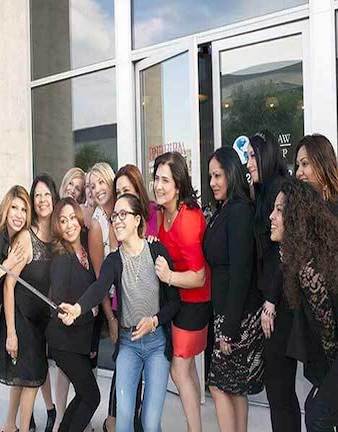The Las Vegas immigration attorneys of Margo Chernysheva are experienced legal professionals with proven track records of success. Their knowledge and unique abilities are valuable assets of our firm.
Clients from all over the world, many of whom do not speak English, rely on the advice of our Las Vegas immigration attorneys as they apply for visas, permanent residency, asylum and U.S. citizenship through naturalization.


Our entire legal staff is qualified and ready to serve new clients, both individuals and businesses, wanting skillful legal counsel and advice on various matters of American immigration law.
With a staff that can communicate with and counsel clients in English, Armenian, Mandarin Chinese, Cantonese, French, Russian, Spanish and Tagalog, Margo Chernysheva is a unique and capable provider of immigration related legal counsel.
Some of Our Success Story’s
If you meet certain requirements, you may become a U.S. citizen either at birth or after birth.
To become a citizen at birth, you must:
To become a citizen after birth, you must:
The steps to becoming a Green Card holder (permanent resident) vary by category and depend on whether you currently live inside or outside the United States. The main categories are:
Many people get Green Cards (become permanent residents) through family members. You may be eligible to get a Green Card as:
Is Your Family Member an "Immediate Relative?"
“Immediate relatives” of a U.S. citizen are defined as a spouse, unmarried children under the age of 21, and parents. Immediate relatives always have a visa number immediately available. To learn more, see the “Green Card for an Immediate Relative of a U.S. Citizen” page.
If the family member of the U.S. citizen is not an immediate relative, then the U.S. citizen may still be able to sponsor them via what is called a “family preference category.” Eligible relatives include:
In order for you to come to the United States lawfully as a nonimmigrant to work temporarily in the United States your prospective employer must generally file a nonimmigrant petition on your behalf with USCIS1. The main nonimmigrant temporary worker classifications are listed in the table below. For more information about the filing requirements for particular nonimmigrant classifications, see the specific classification links under "Temporary Workers" to the left.
Spouses and children who qualify for dependant nonimmigrant classification of a temporary worker and who are outside of the United States should apply directly at a U.S. consulate for a visa.
Spouses and children requesting a change of status or extension of stay in a dependent nonimmigrant classification must file Form I-539, Application to Extend/Change Nonimmigrant Status. Please see the Form I-539 instructions for further information on filing procedures for this application.
Aliens employed in the U.S. may have a U.S. Tax obligation. See the Internal Revenue Service (IRS) for more information.
Approximately 140,000 immigrant visas are available each fiscal year for aliens (and their spouses and children) who seek to immigrate based on their job skills. If you have the right combination of skills, education, and/or work experience and are otherwise eligible, you may be able to live permanently in the United States.
Some immigrant visa preferences require you to already have a job offer from a U.S. employer. This employer will be considered your sponsor. For some visa categories, before the U.S. employer can submit an immigration petition to USCIS, the employer must obtain an approved labor certification from the U.S. Department of Labor (DOL). The DOL labor certification verifies the following:
You may be eligible for an employment-based, first-preference visa if you have an extraordinary ability, are an outstanding professor or researcher, or are a multinational executive or manager. Each occupational category has certain requirements that must be met:
You may be eligible for an employment-based, second preference visa if you are a member of the professions holding an advanced degree or its equivalent, or a foreign national who has exceptional ability. Below are the occupational categories and requirements:
You may be eligible for this immigrant visa preference category if you are a skilled worker, professional, or other worker. Each occupational category has certain requirements that must be met Skilled Workers:
Professionals:
Unskilled Workers (Other Workers) – You must be capable, at the time the petition is filed on your behalf, of performing unskilled labor (requiring less than 2 years training or experience), that is not of a temporary or seasonal nature, for which qualified workers are not available in the United States.
You may be eligible for an employment-based, fourth preference visa if you are a special immigrant. The following special immigrants are eligible for the fourth preference visa:
USCIS administers the EB-5 Program. Under this program, entrepreneurs (and their spouses and unmarried children under 21) are eligible to apply for a green card (permanent residence) if they:
This program is known as EB-5 for the name of the employment-based fifth preference visa that participants receive. Congress created the EB-5 Program in 1990 to stimulate the U.S. economy through job creation and capital investment by foreign investors. In 1992, Congress created the Immigrant Investor Program, also known as the Regional Center Program. This sets aside EB-5 visas for participants who invest in commercial enterprises associated with regional centers approved by USCIS based on proposals for promoting economic growth.
If you plan to marry a foreign national outside the United States or your fiancé(e) is already residing legally in the United States, you do not need to file for a fiancé(e) visa.
If you petition for a fiancé(e) visa, you must show that:
Secretary of Homeland Security Janet Napolitano announced that same sex couples married in a state where same-sex marriage is legally recognized will receive same immigration benefits as opposite-sex couples in the United States. Hence, you can apply for and receive immigration benefits for your spouse as long as the legal marriage took place in a jurisdiction (in the US or abroad) where same-sex marriage is recognized. Please see below for the issued statement.
Statement from Secretary of Homeland Security Janet Napolitano:
“After last week’s decision by the Supreme Court holding that Section 3 of the Defense of Marriage Act (DOMA) is unconstitutional, President Obama directed federal departments to ensure the decision and its implication for federal benefits for same-sex legally married couples are implemented swiftly and smoothly. To that end, effective immediately, I have directed U.S. Citizenship and Immigration Services (USCIS) to review immigration visa petitions filed on behalf of a same-sex spouse in the same manner as those filed on behalf of an opposite-sex spouse.”
Q1: I am a U.S. citizen or lawful permanent resident in a same-sex marriage to a foreign national. Can I now sponsor my spouse for a family based migration visa?
A1: Yes, you can file the petition. You may file a Form I-130 (and any applicable accompanying application). Your eligibility to petition for your spouse, and your spouse’s admissibility as an migration at the immigration visa application or adjustment of status stage, will be determined according to applicable migration law and will not be automatically denied as a result of the same-sex nature of your marriage.
Q2: My spouse and I were married in a U.S. state that recognizes same-sex marriage, but we live in a state that does not. Can I file an migration visa petition for my spouse?
A2: Yes, you can file the petition. In evaluating the petition, as a general matter, USCIS looks to the law of the place where the marriage took place when determining whether it is valid for immigration law purposes. That general rule is subject to some limited exceptions under which federal migration agencies historically have considered the law of the state of residence in addition to the law of the state of celebration of the marriage. Whether those exceptions apply may depend on individual, fact-specific circumstances. If necessary, we may provide further guidance and legal advice on this question going forward.
Some of Margo Chernysheva most popular practice areas are business immigration, investor visas, immigration court, waivers of inadmissibilities, and family-sponsored immigration.
The attorneys of Margo Chernysheva, based in Las Vegas, NV, have the skills that clients want and the experience to meet and exceed expectations. Whether they’re foreign students wanting to study in the U.S., investors who want to invest in the U.S. economy, business professionals who want to work in the U.S., or entertainers/performers who want to display their talents for an American audience, our firm’s attorneys can help foreign nationals reach their American visa goals.
We can also help family members of current visa holders get their own visas so they can visit their loved ones in the U.S.
At Margo Chernysheva we help clients achieve success in all immigration matters. For more than 6 years our attorneys handled thousands of clients with straightforward as well as complex cases.
This means whatever is your immigration situation, chances are we already have experience with something similar.